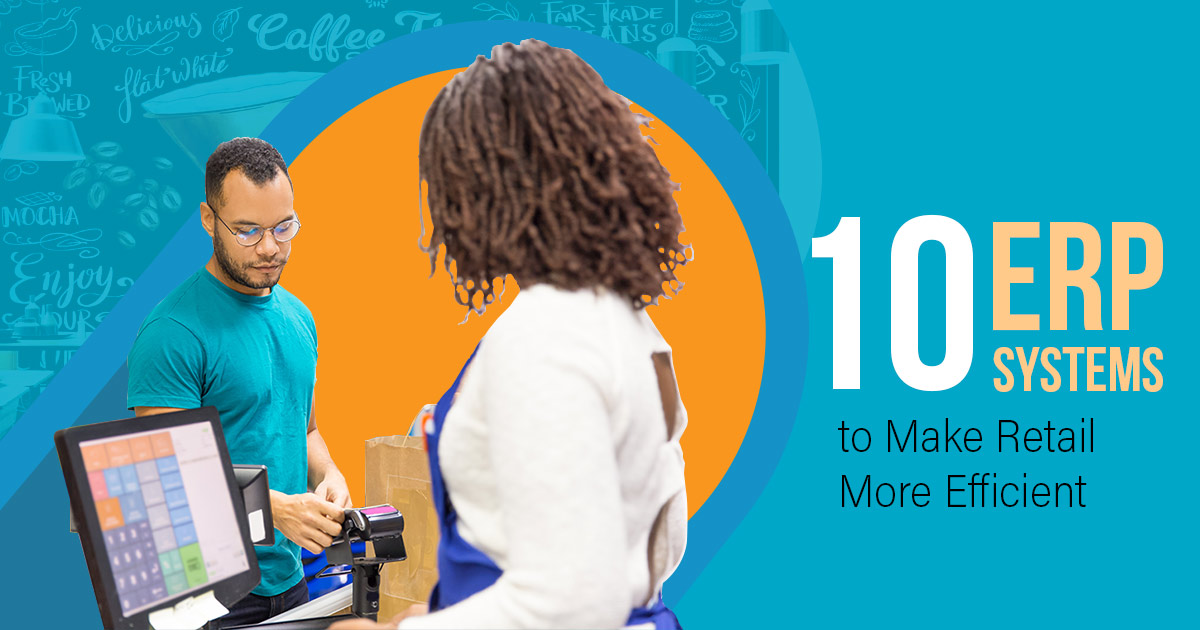10 Good ERP System that Fit What Retail Businesses Need

Retail businesses thrive on smooth operations, making it essential to have tools that streamline inventory tracking, sales processes, customer engagement, and supply chain management. The right ERP software for retail industry operations can simplify processes, improve decision-making, and enhance customer experiences. With numerous solutions available, finding the best ERP for retail requires careful evaluation.
Top Retail ERP Systems
1. Infor CloudSuite Retail
Infor CloudSuite Retail provides a flexible cloud-based platform designed to support both brick-and-mortar stores and e-commerce operations. This platform includes advanced inventory management, order processing, and customer engagement tools. It also integrates with Infor’s HR and financial management solutions, making it a complete retail ERP solution.
2. Acumatica
Acumatica’s open API provides flexibility, allowing easy integration with existing systems. It includes embedded inventory control, CRM, and financial management. Retailers can automate purchase orders and set up notifications for approvals. The system also supports third-party integrations with platforms like BigCommerce and PayPal.
3. Epicor
Epicor is designed for small retailers looking to streamline operations. It includes features like POS systems, payment processing, demand forecasting, and loyalty program management. This ERP software for retail industry businesses offers easy integration with e-commerce platforms while providing insights into sales trends and customer behavior.
4. Brightpearl
Brightpearl is built for omnichannel retailers and wholesalers. It streamlines order management for high-volume retailers while seamlessly connecting with major e-commerce platforms like Shopify and Amazon. With features like inventory tracking, demand planning, and workflow automation, it simplifies retail operations.
5. SAP Business One
SAP Business One provides robust inventory management capabilities. It enables retailers to monitor products with serial numbers and efficiently oversee inventory across multiple warehouse locations. The system includes financial management, CRM, and real-time data analysis, making it one of the top retail ERP systems for small and mid-sized businesses.
6. Microsoft Dynamics 365 Business Central
Microsoft Dynamics 365 is a comprehensive solution for large retailers. It provides live inventory monitoring, in-depth sales analytics, and powerful customer relationship management features. Retailers can manage omnichannel sales, forecast demand, and automate order fulfillment. The system also integrates with POS systems for a smooth customer experience.
7. NetSuite for Retail
NetSuite for Retail is an all-in-one ERP solution for both B2B and B2C retailers. It supports real-time inventory management, order processing, and CRM functionalities. This cloud-based system provides financial insights and business intelligence, helping retailers improve efficiency and profitability.
8. Oracle Retail
Oracle Retail is designed for omnichannel businesses managing complex operations. It supports e-commerce, store sales, and customer returns through a unified system. The platform includes real-time inventory tracking and CRM features that help businesses enhance customer experiences while optimizing stock levels.
9. Priority ERP
Priority ERP provides a cloud-based solution for businesses of all sizes. It caters to industries such as wholesale, healthcare, and retail. With real-time data tracking and automation capabilities, it simplifies inventory management and improves decision-making.
10. SYSPRO
SYSPRO is a cloud ERP built for retailers and distributors. It offers scalable solutions for businesses handling multiple locations. Features include advanced supply chain management, real-time order tracking, and seamless integration with e-commerce platforms.
How to Choose the Right ERP Software for Your Retail Business
Choosing the right ERP software for retail can streamline operations and support business growth. Here are some easy tips to help you decide:
- Know Your Needs – Identify what your business struggles with, like tracking inventory, managing multiple sales channels, or improving customer experience. Pick an ERP that solves these problems.
- Think About Growth – Choose a system that can handle more products, stores, and customers as your business expands.
- Ensure Easy Integration – Make sure the ERP works well with your existing tools, like POS systems, e-commerce platforms, and payment processors.
- Look for Real-Time Insights – A good ERP provides live updates on sales, stock levels, and customer trends, helping you make better decisions.
- Keep It User-Friendly – A system that’s easy to use means faster training for your team and fewer mistakes.
- Decide Between Cloud or On-Premise – Cloud ERP lets you access data from anywhere and updates automatically. On-premise gives more control but needs IT maintenance.
- Check for Good Support – Reliable customer service and training make ERP setup and daily use much easier.
- Compare Costs Wisely – Look beyond the initial price. Consider ERP’s long-term value, including support, updates, and additional features.
Choosing the right ERP system helps your retail business run more smoothly, keep customers happy, and grow successfully.
How the Right ERP System Can Help Your Business
The right ERP software for retail can transform the way a business operates. A well-chosen system streamlines processes, making inventory management, sales tracking, and customer service more efficient. It ensures real-time data access, allowing businesses to make smarter decisions and respond quickly to market changes.
A strong retail ERP solution also enhances the customer experience by improving order accuracy, reducing delays, and supporting seamless shopping across multiple channels. As businesses grow, a scalable ERP system can adapt to new locations, products, and customer demands without disruption.
